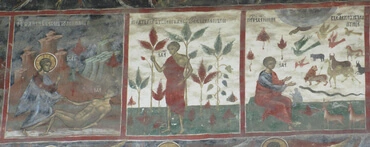Erläuterung zu Genesis 2:18
Durch Brian David (maschinell übersetzt in Deutsch)

In der Bibel wird eine Person, eine Kirche oder eine Nation oft als "allein" bezeichnet, um darauf hinzuweisen, dass sie himmlischer Natur ist - das heißt, dass sie von der Liebe zum Herrn motiviert und im Leben direkt vom Herrn geführt wird und somit nicht von den Versuchungen des Bösen und der Falschheit umgeben ist. Dies war der Fall bei der Urkirche, die durch den "Menschen" oder "Adam" repräsentiert wird. Aber das blieb nicht so.
Irgendwann - wahrscheinlich über viele Generationen hinweg - begannen die Menschen, sich selbst zu leiten und selbst zu denken, anstatt sich im Leben und Denken vom Herrn leiten zu lassen. Sie wollten eine direktere Verbindung mit der Welt herstellen. Sie wollten nicht mehr "allein" sein. Damit wandten sie sich von ihrem höchsten, gesegnetsten Zustand ab - dargestellt durch die Aussage "es ist nicht gut".
Der Herr bereitete sich also darauf vor, ihnen ihren Wunsch zu erfüllen, indem er ihnen einen "Helfer" schenkte - einen Sinn für das Leben als ihr eigenes, der in der Diskussion über Gen 2,22 näher beschrieben wird.
(Verweise: Himmlischen Geheimnissen 138, 139, 140)
The New Jerusalem and its Heavenly Teachings #28
28. Will and Understanding
We have two abilities that make up our life, one called will and the other understanding. 1 They are distinguishable, but they are created to be one. When they are one, they are called the mind; so they are the human mind and it is there that all the life within us is truly to be found.
Fußnoten:
1. The Latin words here translated "will" and "understanding" are voluntas and intellectus, respectively; the latter is also sometimes translated " intellect. " In Swedenborg's use, however, intellectus has a somewhat broader connotation than understanding or intellect has today, one more consonant with the use of the Latin word in the system of the Scholastics. For example, in the philosophy of the major figure of Scholastic thought, Thomas Aquinas (1224 or 1225-1274), which underlies the terminology of much of philosophical language up to and including Swedenborg's time, intellectus encompasses all of what we associate with the faculties of mind, not only the capacity to reason and understand, but the capacity to perceive ideas in the abstract, as well as the mind's ability to be aware of itself (Shallo 1923, 115-116). The complementarity of will and intellect is also something Swedenborg shares with Scholastic thought. For an overview of the relationship between the will and the intellect, see True Christianity 397; for a detailed and extensive account of their interaction as analogous to that of the heart and the lungs, see Divine Love and Wisdom 394-431. For discussion of the related term "intellectual truth," see note 1 in New Jerusalem 26 above. For further discussion of the will and the understanding, see note 1 in New Jerusalem 33 below. [GFD, RS, JSR]






